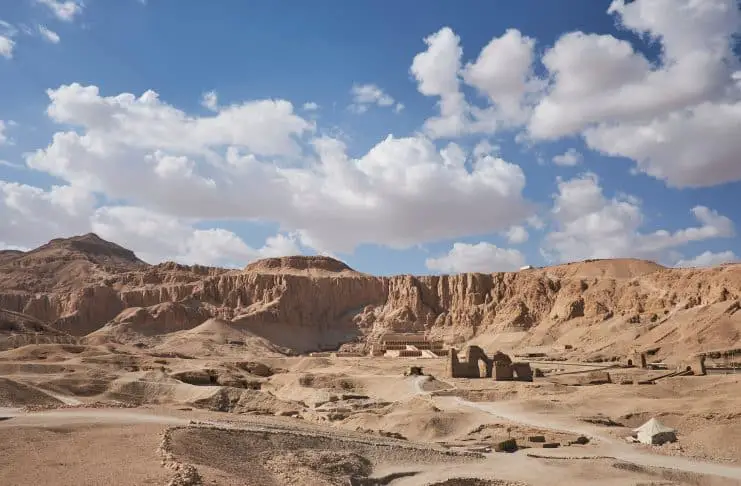
Necropolis of el-Asassif - Image Credit : Shutterstock
POLISH ARCHAEOLOGISTS EXCAVATING IN THE THEBAN NECROPOLIS HAVE FOUND CROCODILE HEADS IN THE TOMBS OF TWO EGYPTIAN NOBLES.
POLISH ARCHAEOLOGISTS EXCAVATING IN THE THEBAN NECROPOLIS HAVE FOUND CROCODILE HEADS IN THE TOMBS OF TWO EGYPTIAN NOBLES.
The Theban Necropolis is a region on the west bank of the Nile, opposite Thebes (Luxor) in Upper Egypt. It was used for ritual burials for much of the Pharaonic period, especially during the New Kingdom.
Archaeologists from the Centre of Mediterranean Archaeology at the University of Warsaw were excavating at the Necropolis of el-Asassif, just to the west of the causeway that leads to the Mortuary Temple of Hatshepsut.
The team have been studying two tombs in the necropolis since 2013, one belonging to “Cheti”, an important official during the reign of Pharaoh, Nebhepetra Mentuhotep II (reigned 2055-2002 BC), and the second from an anonymous, but high-status member who served at the royal court.
Within both tombs, archaeologists recently discovered the heads of nine crocodiles wrapped in fabric, which were neither mummified nor given any special treatments for preservation.
The skulls belonged members of the Crocodylus niloticus species, a large crocodilian native to freshwater habitats in Africa. Only skull fragments and mandibles have survived, likely due to previous excavations a century ago by Herbert Winlock, from the Metropolitan Museum of Art, as researchers of the time paid very little attention to animal remains and dumped them in a pile.
Image Credit : Dr. Patryk Chudzik
In Ancient Egypt, Crocodiles were the object of worship in the form of the god, Sobek. Sobek is associated with the Nile crocodile or the West African crocodile and is represented either in a true crocodilian form, or as a human with a crocodile head.
Sobek was also associated with pharaonic power, fertility, and military prowess, but served additionally as a protective deity with apotropaic qualities, invoked especially for protection against the dangers presented by the Nile.
Sobek was also associated with pharaonic power, fertility, and military prowess, but served additionally as a protective deity with apotropaic qualities, invoked especially for protection against the dangers presented by the Nile.






No comments:
Post a Comment